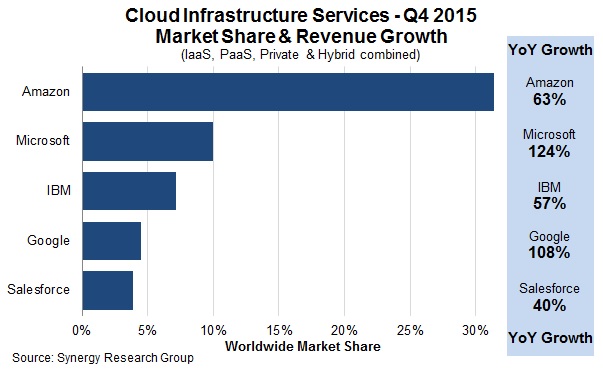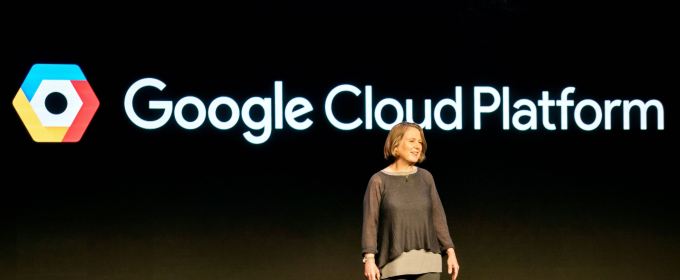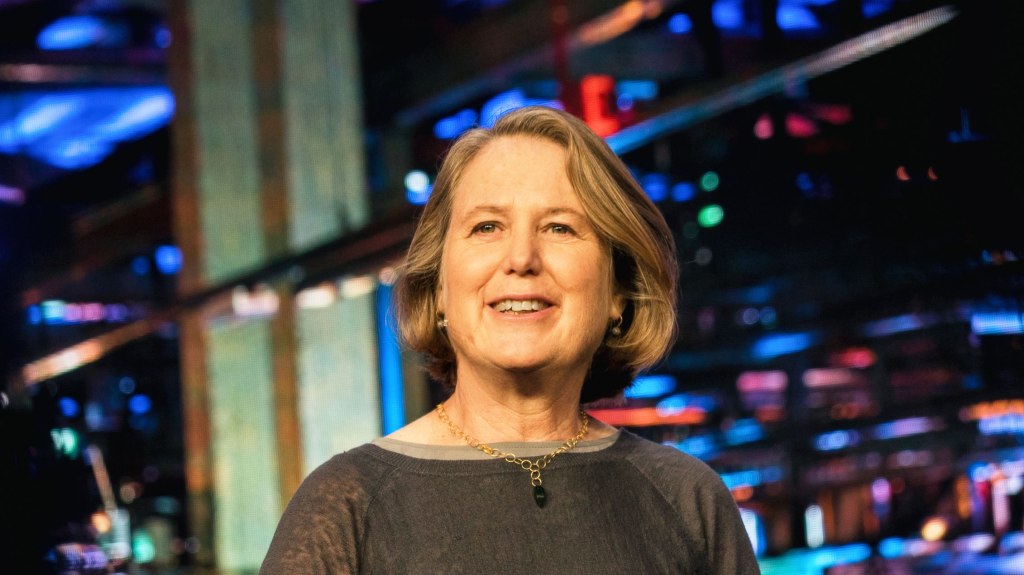When Google bought bebop Technologies last fall for $348 million, it got more than a stealthy startup. It also landed Diane Greene as executive vice president of Google Cloud Enterprise — and that perhaps was the bigger prize.
Greene brought with her years of industry experience, having co-founded and been CEO at VMware for a decade, building it into a virtualization powerhouse. In fact, under Greene’s watch, EMC bought VMware in 2003 for $635 million. She stuck around for five years, seeing the company spun off in an IPO in 2007, before departing in 2008 a wealthy woman.
She spent the next several years helping other companies as a board member. One of those companies was Alphabet. It was through this relationship that she was lured back to the big corporation, where she was charged with taking Google’s struggling cloud business and turning it into the enterprise powerhouse many suspected it always could be.
Way back in the pack
In a world with three or four big players, by just about any measure AWS is light years ahead of everyone with a market share lead that, as of last year, was 10x bigger than its closest 14 competitors combined. Google is fourth in that mix, behind Microsoft in second and IBM in third, according to numbers from Synergy Research.
The bad news for Google is that it has less than five percent market share as of Q4 2015. The good news is that it grew at a brisk 108 percent for the quarter, second only behind Microsoft’s 124 percent growth rate.

That means Greene has her work cut out for her, but she doesn’t seem all that worried. She says AWS has a big lead simply because it got a head start on everyone else, including Google.
“They were there in the public cloud long before Google. We didn’t decide to do public cloud for about four years after AWS,” Greene told TechCrunch. She says that AWS has a big chunk of what essentially is a very small piece of the potential market, and she believes her company has plenty of time to catch up and grab a substantial share of the remainder.
While that’s all true, it’s worth pointing out that Google has had six years to work at this and, in spite of all its resources, has managed to garner less than five percent of market share.
The right woman for the job
After having so much success, why did Greene want to go back to a high-level executive job at a big company and take on this challenge to improve Google’s cloud position? She says she just sort of fell into it, but given her background and experience in the enterprise, she certainly appears to be the right person for the job.
One thing led to another and we were having trouble finding someone, and I eventually said I would do it.
As she tells it, she had a lot of conversations with the folks at Google as part of her job as an Alphabet board member, and she began to see a role for herself there. It all started when she became friendly with Urs Hölzle, senior VP of technical infrastructure at Google Cloud, while walking their dogs together. She knew they were ramping Google Cloud pretty aggressively. As their friendship grew, they were discussing possible candidates for the role to run the overall cloud business.
“He is a totally brilliant and wonderful person. We started taking our dog for walks and became pretty good friends,” she explained. Eventually they focused on her. “One thing led to another and we were having trouble finding someone, and I eventually said OK I would do it — and here I am,” she said. With Greene, Google scored someone with a tremendous enterprise pedigree.
At the time of her hiring in November, Steve Herrod, who was CTO at VMware under Greene, and who is currently managing partner at venture capital firm General Catalyst, spoke of her in glowing terms. “She is awesome and immediately changes the game for Google’s cloud efforts. The engineering team at bebop was outstanding as well and they’ll bring a ton of enterprise DNA to Google,” he told TechCrunch at the time.
Taking care of business
When Greene came on board, the cloud business was fragmented. One of the first things she did was unify all the pieces under a single umbrella, with her at the top of the unit. Sundar Pichai outlined the new organization in a company blog post when he announced Greene’s hiring. As he stated at the time, Greene would be in charge of a newly integrated enterprise cloud business that brought together Google for Work, Google Cloud Platform and Google Apps under a consolidated product, engineering, marketing and sales team.
She said one of the reasons for this single Google Cloud view was her experience at VMware, where they valued integrated execution across the company. She felt that in order for this to work well, all these cloud pieces had to be working in sync with a consistent message up and down the entire cloud stack.
The other thing she emphasized at VMware that she brought to Google was the importance of building a broad partnership network. “We were super friendly to partners at VMware and I brought that in here. There are huge opportunities to partner with companies and we’ve been accelerating that very quickly. Google is committed to open source and open APIs and part of that is creating a partner-friendly place,” she explained.
While she wasn’t ready to name names yet because the ink was still drying on some of the agreements, Google did let me know they have 13,000 partners in the network, so it’s not something they just started after Greene came to the company, but she is attempting to build on that existing effort.
The enterprise heats up
As Greene applies her enterprise chops to the Google Cloud platform, she rightly sees a market that’s heating up — and one that Google should by all rights be well-positioned to grab a big piece of.

“The enterprise has become a super interesting and exciting place,” she said. “Everybody is realizing they have to digitally transform themselves.” She sees that cloud having a big role in that as it allows companies to communicate better, flatten hierarchies and move much more quickly than they could running equipment inside a data center.
The enterprise has become a super interesting and exciting place. Diane Greene, Google
One of the big difference makers Greene is seeing is the power of data and the role the cloud plays in that. “It’s all about data and getting insights out of data. This is all fairly recent, that everybody is like ‘whoa, if I don’t do this and my competitor does, I’m going to be left behind,’” she said.
As you might expect, she sees Google as a strong contender for these transforming businesses because it has had to do this itself as a company, building data centers, processing huge amounts of data and applying analytics to it to understand what it has. She sees that experience as a big differentiator for her company.
“It is Google’s time for enterprise. Google has a lot to offer the world and it all came together in a nice way. There was just a lot of effort going on around the enterprise that has set things up really well,” she explained.
That could be true, but Google needs to win the hearts and minds of enterprise IT staff, who might mistakenly see Google as merely Google Apps and not the entire cloud stack it has become. Having a spokesperson like Greene should help in that regard, and she says a big part of her job is talking to customers and finding out what they need and how Google can help.
There’s plenty of time
AWS is clearly the big dawg at the moment, but Greene doesn’t seem all that worried. In spite of AWS existing for a decade, she sees Google as a worthy competitor in a market that’s just getting started.
“I don’t feel like we both started off building cloud at the same time. We came from different places. The place where we are behind and that’s changing quickly is in workloads. Every customer wants to run on all the clouds. Pilots have been deployed and are up and running and growing incredibly fast right now,” she said.
She gets the current landscape, but with her in charge, she sees a market that’s wide open for competition and a company that’s ready to seize that opportunity.
“They have more workloads and features and more partners, but those are very straightforward things to change.” she said.





























Comment